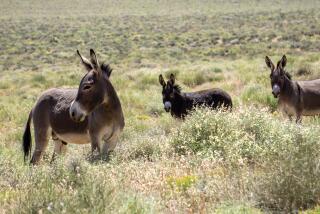Citizens’ Panel to Continue Contract : Sale of Animals to UCSD Backed
- Share via
The citizens’ committee that advises the county on how best to deal with stray animals voted Wednesday to continue the controversial contract under which some county animal shelters sell dogs and cats to UC San Diego for research.
The Animal Control Advisory Committee voted 5-2 with one abstention to continue the agreement, which last year resulted in about 800 animals being sold to the university for use in such areas as heart and lung research.
The committee also opted to try to end the often emotional debate on the matter, choosing to take a final vote on the question rather than refer it to the county Board of Supervisors with a recommendation.
“If people were compassionate and responsible, this wouldn’t be a problem because the pound wouldn’t have animals,” contended Georjean Jensen, who made the motion to continue the contract. “I just think human life takes precedence over dogs and cats.”
The committee’s decision runs counter to recent trends in California, where animal advocates say nearly all other counties have terminated the practice. In San Diego County, municipalities that handle their own animal control do not sell the animals for research.
“I’m appalled that this committee . . . still is unable to make the distinction between the question of animals in research and the question of what the source of those animals should be,” said Jane Cartmill of People for the Ethical Treatment of Animals.
Cartmill and other critics vowed to lobby the supervisors to reconsider the issue.
“This is a political issue, and we’ll deal with it politically,” said Mary Ann Melvin, director of a group called Stop Taking Our Pets.
Under the current system, UCSD may buy dogs and cats that are impounded by the county’s Department of Animal Control. The department’s three shelters serve the unincorporated areas of the county and any cities that contract for animal control.
Animals Held for 3 Days
Officials say that only animals without collars or identification may be sold for research. Animals are held for three working days, screened for adoption and, if found unsuitable, are held another three days before being offered to UCSD.
Last year, 691 dogs and 129 cats went to UCSD, selling for $55 per dog and $25 per cat, plus tax.
The department killed 25,115 impounded and unclaimed animals by lethal injection.
The Los Angeles County Board of Supervisors refused last year to order that county’s shelter to stop selling animals for medical research. Only six of California’s 58 counties still allow the practice, animal control officials and advocates say.
On Wednesday, committee members who favored continuing the contract expressed confidence that UCSD uses the animals humanely and sparingly. They repeatedly pointed to the fact that the university has a special committee that must review and approve all animal research.
They cited the university’s argument that it would have to pay far more for animals if it were forced to buy them from special breeders, and they noted that twice as many animals would die under such a system because the shelter animals would still be killed.
Finally, they stressed the medical advances that have resulted from animal research.
On the other side, one committee member argued that it was not the role of a shelter to supply animals for experimentation. Another doubted whether researchers really follow the guidelines for humane treatment.
Several said they remained, even after poring over voluminous correspondence on the subject, impossibly torn on the issue. They even briefly discussed recommending that the issue be put to a countywide vote.
George Eigenhauser Jr., the committee chairman, said the decision ultimately would be a subjective one because all seemingly objective standards, such as public opinion polls and cost-benefit analyses, could be called into question.
“The only thing left is the difference between two moral positions,” Eigenhauser said. “Is it more immoral to use pets in research than animals bred for that purpose?”
In the end, Eigenhauser abstained. Voting in favor of continuing the contract were Toni Hanson, Georjean Jensen, Audrey Young, Dr. Bruce Lindsey and Glen Gayton. Voting against were Susan McFarland and Barbara Tice-Simons.
Dr. Jean Immenschuh, the ninth member, was absent. However, she submitted a letter supporting the contract.
More to Read
Sign up for Essential California
The most important California stories and recommendations in your inbox every morning.
You may occasionally receive promotional content from the Los Angeles Times.













